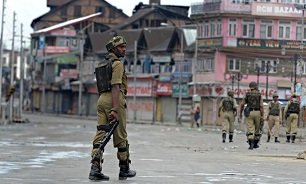Pakistan Lawmaker Warns of Nuclear War over Kashmir
 Addressing a seminar in the capital Islamabad, Shehryar Khan Afridi, chairman of the parliament’s Kashmir committee, claimed New Delhi was using backdoor channels to resume talks to Pakistan. However, he said his country would not talk to India unless Kashmir issue was on the agenda.
Addressing a seminar in the capital Islamabad, Shehryar Khan Afridi, chairman of the parliament’s Kashmir committee, claimed New Delhi was using backdoor channels to resume talks to Pakistan. However, he said his country would not talk to India unless Kashmir issue was on the agenda.
Kashmir, he further said, became a key issue in the global digital space and that Pakistan would not allow India to mislead the world on the ongoing “genocide” there.
“We are reaching out to all the global platforms to raise Kashmir [issue],” he said adding that the parliament’s committee was engaging with 22 global forums to sensitize the world on the lingering dispute.
Sardar Masood Khan, president of Pakistani-administered Kashmir, also known as Azad Kashmir, charged that extrajudicial killings have become a norm in disputed Jammu and Kashmir.
Indian forces, Khan went on to argue, arrest youth and later gun them down in fake police “encounters”.
“The world knows well about the Indian atrocities being committed by the occupational forces in occupied Kashmir but commercial interests are major hurdle in taking action against India,” he added.
Apart from issuing half a million domiciles to non-Kashmiris, he said, India was planning to award citizenship rights to 1.7 million migrant workers as well.
Kashmir, a Muslim-majority Himalayan region, is held by India and Pakistan in parts and claimed by both in full. A small sliver of Kashmir is also held by China.
Since they were partitioned in 1947, the two countries have fought three wars -- in 1948, 1965 and 1971 -- two of them over Kashmir.
Also, in Siachen glacier in Northern Kashmir, Indian and Pakistani troops have fought intermittently since 1984. A cease-fire came into effect in 2003.
Some Kashmiri groups in Jammu and Kashmir have been fighting against Indian rule for independence, or for unification with neighboring Pakistan.
According to several human rights organizations, thousands of people have reportedly been killed in the conflict in the region since 1989.
message end/